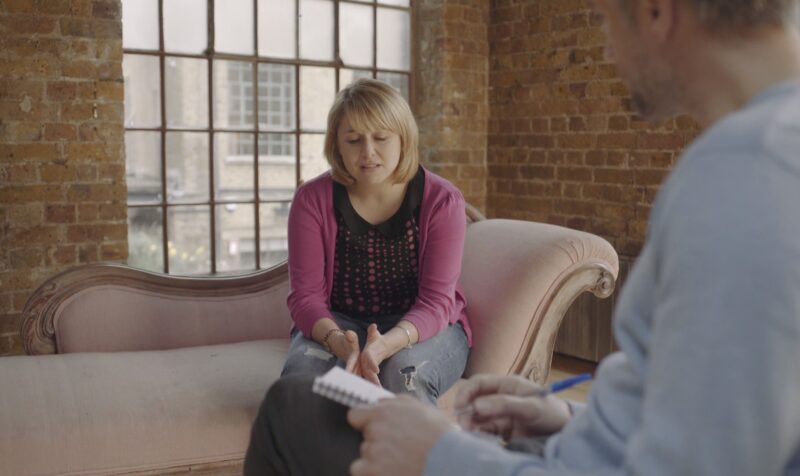Therapy is a space where both minor and major aspects of life can be explored. There are no “wrong” topics in therapy, as it’s a place designed for open and honest communication. Whether you’re discussing day-to-day stressors or deep-seated emotional issues, every topic holds value.
Therapists are skilled in guiding conversations, but it’s also beneficial for clients to think proactively about what they wish to discuss. This approach ensures that therapy sessions are both meaningful and tailored to individual needs.
Understanding the scope of therapy – that it can cover anything from current stressors to deep psychological issues – sets the stage for effective and comprehensive healing.
Key Takeaways:
- Therapy is a versatile environment where all aspects of life, both minor and major, can be explored.
- It’s beneficial for clients to proactively think about topics they wish to discuss in therapy.
- Discussing personal history and background is crucial in therapy.
Let us discuss the most important subjects that should be reflected on during therapy.
Personal History and Background

Discussing your personal history and background is a fundamental aspect of therapy. It’s about painting a comprehensive picture of your life experiences, family dynamics, and previous mental health challenges.
Firstly, it helps your therapist understand the context of your life. Everyone’s background is a complex structure of experiences that shape their beliefs, behaviors, and emotional responses. By sharing your story, you provide your therapist with the necessary insights to tailor their approach specifically to you.
This includes understanding your family dynamics, which often play a significant role in shaping your worldview. For instance, the way your family handled communication, conflict, and emotional expression can profoundly influence how you interact with others and perceive the world.
Secondly, discussing your past experiences, especially those involving mental health, allows your therapist to identify patterns that might be influencing your current state.
For example, previous encounters with anxiety or depression can offer clues about triggers or effective coping strategies. This historical perspective is invaluable in crafting a more effective treatment plan. Moreover, delving into your personal history is an opportunity to explore significant life events and their lasting impacts.
Events such as the loss of a loved one, major life transitions, or past traumas can leave deep imprints on your psyche.
Understanding these events’ emotional and psychological ramifications can be enlightening, helping you and your therapist to connect past experiences with present challenges.
Current Challenges and Stressors

When you engage in therapy, a significant focus is placed on your current situation, encompassing all the challenges, stressors, and even the positive aspects you’re experiencing. This exploration is vital for several reasons.
Identification of Immediate Triggers
The immediate reasons for seeking therapy are often a mix of specific events and general feelings. These could range from tangible issues like job loss, relationship problems, or financial stress to more abstract concerns like chronic anxiety, a sense of dissatisfaction, or a feeling of being stuck.
By identifying these triggers, your therapist can gain a clearer understanding of what you’re facing in the present moment.
Discussing current challenges allows your therapist to see how these issues are affecting your day-to-day life. This might include your work performance, relationships, physical health, and overall well-being. Understanding this impact is crucial for developing an effective therapy plan.
Recognizing Patterns and Connections

Often, current stressors are not isolated incidents but are connected to broader patterns in your life. For example, recurrent relationship issues might reveal a pattern in how you relate to others, or ongoing job dissatisfaction might point to deeper questions about your career path or personal aspirations.
Collaborative Strategy Development
Openly discussing your current challenges enables you and your therapist to work together to develop strategies to address these issues. This collaborative approach ensures that the solutions are tailored to your specific needs and circumstances.
Evolution and Intersection of Challenges
It’s important to recognize how your current challenges evolve over time and intersect with other aspects of your life. For instance, a current stressor like a job loss can affect your relationships, self-esteem, and future planning. Understanding these interconnections is key to holistic therapy.
| Aspect | Description | Impact on Life | Potential Strategies |
|---|---|---|---|
| Specific Life Events (e.g., Job Loss) | Discussing the circumstances and feelings around the event. | Assessing how this event affects areas like financial stability, self-esteem, and daily routine. | Developing coping strategies, exploring new opportunities, and building resilience. |
| Relationship Issues | Exploring conflicts, communication problems, or satisfaction levels in relationships. | Understanding the impact on emotional well-being and social life. | Enhancing communication skills, relationship counseling, and addressing underlying issues. |
| General Feelings (e.g., Anxiety) | Identifying triggers and manifestations of these feelings. | Evaluating how these feelings affect mental health, physical health, and decision-making. | Cognitive-behavioral techniques, mindfulness practices, and stress management strategies. |
| Positive Aspects | Acknowledging and appreciating positive elements in life. | Leveraging these aspects to enhance overall well-being and resilience. | Focusing on strengths, gratitude practices, and using positives as a buffer against stress. |
Emotions and Feelings
Exploring emotions and feelings is central to therapy. This includes discussing both positive and negative emotions and understanding their triggers and impacts. It’s important to recognize that discussing positive aspects of life is valuable in therapy.
The Full Range of Emotions
Therapy provides a safe space to explore a wide array of emotions, from joy and contentment to anger and sadness. It’s crucial to recognize that all emotions, regardless of their nature, are valid and informative. Positive emotions can be as revealing as negative ones, offering insights into what brings fulfillment and satisfaction to your life.
Identifying Triggers and Patterns
A significant part of emotional exploration involves identifying what triggers certain emotional responses. This could include specific situations, interactions with certain people, or even internal thoughts. Recognizing these triggers is the first step in understanding the patterns of your emotional responses.
For instance, you might discover that certain environments or stressors consistently evoke anxiety or that particular achievements consistently bring joy.
Impact on Behavior and Decision-Making

Emotions play a critical role in influencing behavior and decision-making processes. By understanding your emotional responses, you can begin to see how they affect your actions and choices.
Feelings of insecurity might lead to avoidance behaviors, or happiness might inspire more social interactions. This awareness is key to making more informed and conscious decisions.
Developing Emotional Intelligence
Therapy aims to enhance your emotional intelligence, which involves not only recognizing and naming your emotions but also understanding how to manage and express them healthily.
This includes learning how to soothe yourself during times of distress, how to express your emotions in a way that is constructive rather than destructive, and how to maintain emotional balance.
Often, our emotional responses have deep roots in past experiences or learned behaviors.
Therapy can help unravel these connections, providing a clearer understanding of why certain emotions are so powerful or pervasive. This exploration might lead back to childhood experiences, past traumas, or ingrained beliefs about oneself and the world.
Building Coping Strategies
A crucial aspect of working with emotions is developing effective coping strategies. This could involve techniques for managing acute emotional responses, like deep breathing for anxiety or journaling for processing complex feelings. It also includes long-term strategies for emotional regulation, such as mindfulness practices or cognitive restructuring.
Self-Esteem and Self-Image

The exploration of self-esteem and self-image is a critical component of therapeutic work. It revolves around how you perceive, value, and think about yourself. This self-perception significantly influences your mental health, behaviors, and interactions with others.
| Aspect | Description | Impact on Mental Health | Therapeutic Strategies |
|---|---|---|---|
| Understanding Self-Perception | Exploring how you view and value yourself. | Influences overall mental well-being, decision-making, and behavior. | Self-awareness exercises, exploring personal values and beliefs. |
| Identifying Underlying Factors | Uncovering experiences and influences shaping self-esteem. | Affects the development of self-esteem and self-image. | Reflecting on past experiences, recognizing societal and familial influences. |
| Addressing Negative Perceptions | Challenging feelings of inadequacy and distorted self-image. | Can lead to depression, anxiety, and other mental health issues. | Cognitive restructuring, affirmations, and reality testing. |
| Building a Positive Self-View | Cultivating a balanced and realistic self-perception. | Enhances confidence, resilience, and emotional stability. | Strengths identification, self-compassion practices, and setting realistic goals. |
| Developing Tools and Strategies | Learning techniques to improve self-esteem. | Empowers self-improvement and personal growth. | Mindfulness, journaling, and therapeutic exercises focused on self-esteem building. |
Coping Mechanisms and Problem-Solving Strategies

In therapy, a significant focus is placed on identifying and refining your coping mechanisms and problem-solving strategies. This process is essential for several reasons:
Assessment of Current Strategies
The first step involves evaluating the coping mechanisms and problem-solving strategies you currently employ. This assessment helps in understanding which strategies are effective and which might be counterproductive or maladaptive.
For example, some individuals might rely on avoidance as a coping mechanism, which can provide short-term relief but often exacerbates the issue in the long run.
New Techniques
Therapy provides an opportunity to learn new coping techniques. These techniques are often evidence-based and have been proven effective in managing specific types of stressors or triggers. For instance, cognitive-behavioral therapy (CBT) offers tools for dealing with negative thought patterns, while mindfulness-based strategies can help in managing anxiety and stress.
Refinement of Existing Strategies

Alongside introducing new techniques, therapy also focuses on refining and improving the strategies you already use. This might involve tweaking your approach to problem-solving or finding more effective ways to implement existing coping mechanisms.
The goal is to make your current strategies more efficient and tailored to your specific needs.
Building a Personal Toolkit
The ultimate aim is to build a personalized toolkit of strategies that you can use outside of therapy sessions. This toolkit is a collection of techniques, approaches, and methods that you find most helpful in managing your day-to-day stressors and triggers.
It’s a resource you can draw upon whenever you face challenges, ensuring you have a range of options at your disposal.
Exploring the Future

Discussing future aspirations and goals is a vital component of the therapeutic process. It serves multiple purposes and has several key aspects:
Linking Present to Future
Therapy often focuses on current challenges and past experiences, but exploring the future is equally important. It creates a bridge between your current therapy work and where you want to be. This forward-looking approach helps in contextualizing your current struggles and achievements within the broader narrative of your life.
Clarifying Goals and Aspirations
Therapy sessions provide a space to articulate and clarify your future goals and aspirations. This could range from specific career objectives and educational pursuits to broader personal development goals like improving relationships, achieving a better work-life balance, or cultivating a new hobby or skill.
Clear goals provide direction and motivation, which are crucial for personal growth.
Once goals are identified, therapy can help in developing a roadmap to achieve them. This involves breaking down larger goals into smaller, manageable steps and setting realistic timelines. It also includes identifying potential obstacles and planning strategies to overcome them.
Aligning Therapy with Future Objectives
Therapy can be more effectively aligned with your long-term objectives. This ensures that the therapeutic work you are doing is not only about resolving current issues but also about building the skills and resilience needed to achieve future goals.
FAQs
Is it okay to ask your therapist questions?
Yes, it’s absolutely okay to ask your therapist questions. It’s important for you to understand your therapy process, and asking questions can help you feel more engaged and informed.
What is the first thing a therapist typically asks?
The first thing a therapist often asks is a broad, open-ended question like “What brings you in today?” or “How can I help you?” This is to give you the opportunity to share your concerns and reasons for seeking therapy.
Do liars tend to avoid answering questions?
Liars may sometimes avoid answering questions directly. They might change the subject, give vague responses, or provide more information than necessary to distract from the truth. However, this behavior isn’t exclusive to lying and can occur for other reasons.
What can cause someone to fail a psychological test?
“Failing” a psychological test isn’t a typical outcome, as these tests are designed to assess and understand behavior, not to be passed or failed. However, inconsistent or dishonest answers can invalidate the results, making it difficult to accurately assess an individual’s mental health or personality.
Final Reflections
Therapy is not an easy process, where a strong therapeutic alliance is crucial for success. It can be challenging but also deeply healing.
Knowing what to discuss can make therapy more efficient and less stressful. This guide aims to provide a comprehensive overview of potential topics, helping you make the most out of your therapy sessions.
